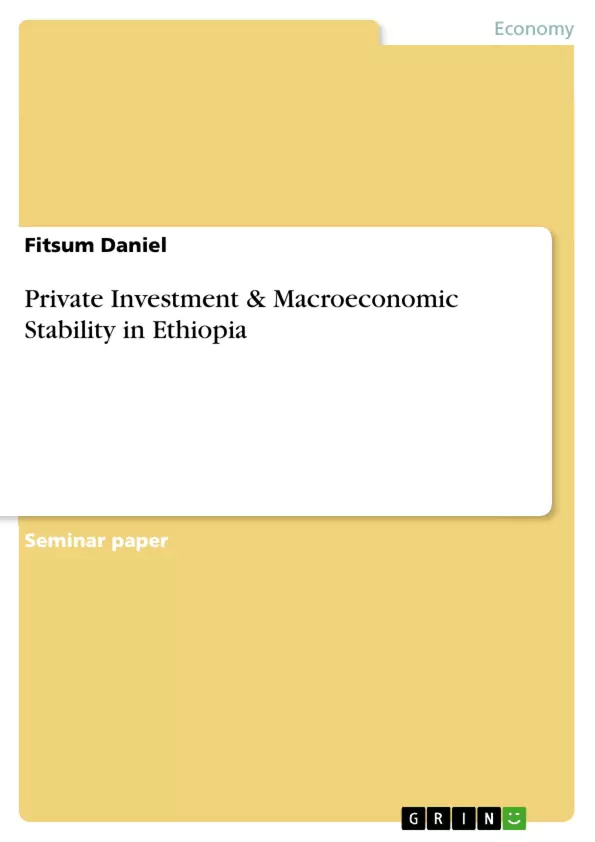The irreversible nature of long-term private investment expenditures has been emphasized in recent literatures on investment behavior. The irreversible nature of investment suggests that installed capital can seldom be put to productive use in a different sector or economic activities, at least not without incurring a substantial cost. In this context, private investors, foreign and local, will be reluctant to commit large expenditures on fixed investments when they are uncertain about the future political, social, and economic environment. Changes in uncertainty are usually associated with unpredictability. Thus, macroeconomic instability - a phenomenon making the domestic macroeconomic environment less predictable - is expected to hamper resource allocation including capital.
As it is well known, investment especially for developing countries like Ethiopia is a motor for growth. Especially private investment (both domestic as well as foreign) should hold the lion share of the total investment of such countries as the capacity of governments in these countries to undertake investment in areas other than infrastructure is very limited. Of the number of determinants of private investment in developing countries, macroeconomic and political stability is believed to be the major one as such countries rate worse in this regard unlike developed countries.
In this regard, a sort of preliminary assessment of the rough relationship between private investment and some key macroeconomic and political stability variables which are relevant in the context of Ethiopia, of course taking into account availability of secondary data, is sought in this term paper work. The hypothesis formulated to be tasted is that high macroeconomic and political instability has significant negative effect on private investment in Ethiopia.
As data in regard with private investment is expected to be very limited (i.e., not more than 17 years data), descriptive analysis (with the help of graphs) is going to be used to reach to some conclusions from the available data.
Inhaltsverzeichnis (Table of Contents)
- INTRODUCTION
- BRIEF THEORETICAL REVIEW
- DATA COLLECTION, DATA AVAILABILITY, ANALYSIS AND CONCLUSION
- Private Investment and Inflation
- Private Investment and Debt Overhang
- Private Investment and Political Instability
- REFERENCES
Zielsetzung und Themenschwerpunkte (Objectives and Key Themes)
This term paper explores the relationship between private investment and macroeconomic stability in Ethiopia, focusing on the impact of inflation, debt overhang, and political instability on private investment decisions. The paper aims to assess the extent to which macroeconomic instability has a negative effect on private investment in Ethiopia.
- The irreversible nature of long-term private investment
- The importance of macroeconomic and political stability for private investment in developing countries
- The influence of macroeconomic instability on resource allocation and investment
- The impact of inflation, debt overhang, and political instability on private investment in Ethiopia
- The limitations of existing economic theories in explaining investment behavior in developing countries
Zusammenfassung der Kapitel (Chapter Summaries)
The introduction highlights the significance of private investment in Ethiopia and outlines the paper's objective to investigate the relationship between private investment and macroeconomic instability. The paper posits that macroeconomic instability, characterized by unpredictability in the domestic macroeconomic environment, can hamper resource allocation and investment.
The theoretical review delves into various models explaining investment behavior, including Keynes's General Theory, the accelerator theory, the neo-classical theory, and Tobin's-Q theory. However, the paper notes that these theories have limitations in explaining investment in developing countries. It then discusses recent research on investment, irreversibility, and uncertainty, arguing that investment decisions are influenced by factors such as the irreversibility of investment, uncertainty over future rewards, and the timing of investment.
The chapter on data collection, analysis, and conclusion focuses on the limited availability of data on private investment in Ethiopia. It highlights the challenges in conducting econometric analysis due to the scarcity of data. The chapter examines the relationship between private investment and inflation, outlining the challenges of accessing reliable data for this analysis.
Schlüsselwörter (Keywords)
The paper focuses on private investment, macroeconomic stability, Ethiopia, inflation, debt overhang, political instability, investment behavior, irreversibility, uncertainty, developing countries, and data limitations.
Frequently Asked Questions
How does macroeconomic instability affect private investment in Ethiopia?
Macroeconomic instability makes the domestic environment less predictable, which hampers capital resource allocation and discourages investors from committing to long-term fixed investments.
What is the significance of "irreversibility" in investment?
Irreversible investment means that once capital is installed, it cannot easily be put to use in another sector without substantial cost. This makes investors highly sensitive to future uncertainty.
What are the key stability variables analyzed for Ethiopia?
The paper focuses on three main variables: inflation rates, debt overhang, and political instability.
Why do traditional economic theories fall short in developing countries?
Theories like Keynes's General Theory or Tobin's-Q often assume stable market conditions. In developing countries like Ethiopia, political and macroeconomic stability are more decisive factors for investment behavior.
What are the data limitations in studying Ethiopian private investment?
Reliable secondary data on private investment is scarce, often covering only a short period (around 17 years), which makes complex econometric analysis difficult and necessitates descriptive analysis.
What is the main hypothesis of this research?
The hypothesis is that high macroeconomic and political instability has a significant negative effect on private investment in Ethiopia.
- Arbeit zitieren
- Fitsum Daniel (Autor:in), 2008, Private Investment & Macroeconomic Stability in Ethiopia, München, GRIN Verlag, https://www.grin.com/document/447112



